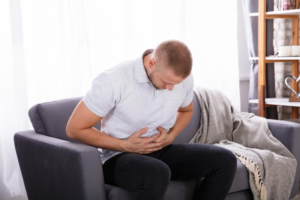Table of Contents

Many of us have experienced these as children, which is not uncommon for adults.
This blog will provide detailed information about the causes and symptoms and ways to overcome these problems to lead a better life.
Symptoms
If you experience these symptoms after drinking water, you should take them seriously and contact your doctor as soon as possible. Here are some of the most common signs that indicate you may have stomach pain and diarrhea after drinking water:
- Pain in the upper abdomen area
- Nausea
- Vomiting (this could be caused by other
Common Causes Of Stomach Pain And Diarrhea
According to the report of – Our World In Data, 1.7 million people died in 2017 because of diarrhea and stomach pain.
The most common cause of stomach pain after drinking water is a stomach virus, such as gastroenteritis. It’s important to remember that symptoms of gastroenteritis usually don’t last more than two days. If you’ve been experiencing bloating, nausea, vomiting, and diarrhea for more than two days, see your doctor to find out what’s happening.
So what causes chronic cases of stomach pain and diarrhea after drinking water? There are many different potential reasons why this could happen, but some of them include the following:
You’re Dehydrated
Dehydration can cause severe stomach pain and diarrhea because it strongly affects your digestive system. If you’re not drinking enough fluids, that’s one reason why you’re experiencing either type of symptom. Water can be a great way to keep hydrated—here’s how much water you should be drinking daily: 1/2 liter (16 ounces) per day for men and 1/3 liter (18 ounces) per day for women (source).
You’ve Recently Eaten Something Too Spicy
Spicy foods can cause symptoms like dehydration, including stomach pain and diarrhea. So if you’ve recently had something hot or spicy that made your mouth feel like it’s on fire, then there’s a good chance it has also left your stomach on fire.
A food Allergy
A food allergy or intolerance can cause diarrhea by causing an immune response that irritates the lining of your digestive tract and causes you to lose water from it.
Gastroenteritis
Gastroenteritis is an inflammation of the lining of the stomach or intestines. Bacteria, viruses, or parasites may cause it.
Drinking Too Much Water
Water is known to dilute your blood, which can lead to dehydration. However, drinking too much water can cause stomach pain, diarrhea, and other symptoms such as dizziness, headache, and fatigue. If you’re experiencing these symptoms after drinking a lot of water, try drinking less or switching to another beverage with less caffeine.
Unfiltered Water
According to a new study, drinking unfiltered water can cause stomach pain and diarrhea.
Researchers at the University of California-San Diego experimented on mice to see if tap water could cause stomach pain and diarrhea when consumed. They found that it did, and bacteria in the water caused this.
The researchers found that the bacteria could enter the mice’s stomachs through their mouths, which is where they also found that they caused a significant amount of inflammation in the stomachs of mice who drank unfiltered tap water.
Remedies Of Stomach Pain And Diarrhea
Stomach pain and diarrhea are two of the most common stomach ailments. While they can be frustrating, plenty of remedies can help you get better fast.
Stay Hydrated
First, drink enough water to stay hydrated. Dehydration can cause severe stomach pain and diarrhea, as well as nausea. If you’re unsure how much water you should drink daily, talk to your doctor about what’s considered normal.
Eat Healthy Food
Second, eat foods high in fiber and Vitamin B12. Fiber-rich foods such as fruits and vegetables help keep your digestive system running smoothly by helping to move food through your body more easily. Plus, they’ll help prevent constipation! Vitamin B12 helps enzymes break down fats into usable energy to fuel your body’s daily activities.
Avoid spicy foods like hot peppers or black pepper unless they’re eaten in small amounts (1 tsp per serving). Spicy foods contain capsaicin, an irritant that can cause gastritis and diarrhea if consumed excessively.
Take Antibiotic
If these remedies aren’t helping, consider taking a probiotic supplement like Culturelle® or VSL#3®. These strains of bacteria have been shown to help ease symptoms of stomach pain and diarrhea in studies.
Take Warm Baths Or Showers
The heat will increase your body’s ability to absorb water, which will help with the swelling in your belly. You may also want to add Epsom salt to the water to enhance its effectiveness.
Drink Clean Water
Water is a great drink, but it can also cause stomach issues if you don’t take the right precautions. Water sitting in your fridge for a few days will have a higher pH level and cause stomach issues for some people. The Same goes for water, which has been sitting in the hot sun for too long.
If you’re finding that your stomach is upset after drinking water, try adding some lemon juice to it—it will help balance out the pH levels and make it easier on your stomach. Or try mixing it with something acidic, like cranberry juice or pineapple juice, instead of plain water.
Always drink filtered water to get rid of stomach pain and diarrhea.
Eat Ginger
Ginger is an excellent remedy for stomach pain and diarrhea because it contains anti-inflammatory properties that help relieve inflammation throughout your body. It also helps with nausea because it reduces brain activity in areas responsible for nausea.
Final Thoughts
Water is extremely beneficial when it comes to the rehydration of body cells. Water can be utilized while treating several types of stomach problems. However, water intake or water as a therapy is not always advisable during certain conditions and stages of the disease because it can harm the body’s systems.
The advice and tips mentioned in this article are only for educational purposes. If you experience any serious side effects like diarrhea or stomach pain, please get in touch with your doctor immediately to assist you further.


